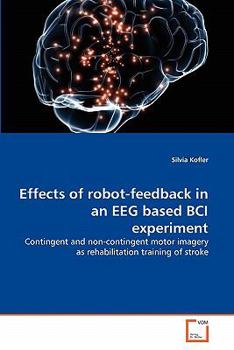Effects of robot-feedback in an EEG based BCI experiment: Contingent and non-contingent motor imagery as rehabilitation training of stroke
This thesis is based on the intention to implement a motor imagery based Brain Computer Interface training paradigm for motor rehabilitation on stroke patients. The study wanted to investigate whether or not the presentation of contingent motor feedback in a motor imagery based BCI training is necessary for learning to control and modulate the SMR band power compared to a motor imagery condition with mock feedback. Fourteen healthy subjects performed four randomly presented motor related tasks in four consecutive sessions of BCI training: active and passive movements with a hand orthosis, as well as motor imagery followed or not with motor feedback via the same orthosis. Two groups were created, one receiving contingent (CF), and the other one receiving fake motor feedback (FF) in the imagery condition with included feedback. The corresponding hypothesis assumed that the group receiving CF would have stronger SMR power modulation and a better BCI control of the hand orthosis than the group receiving FF. This description may be from another edition of this product.
Format:Paperback
Language:English
ISBN:3639302281
ISBN13:9783639302288
Release Date:October 2010
Publisher:VDM Verlag
Length:112 Pages
Weight:0.39 lbs.
Dimensions:0.3" x 6.0" x 9.0"
Related Subjects
PsychologyCustomer Reviews
0 customer rating | 0 review
There are currently no reviews. Be the first to review this work.













